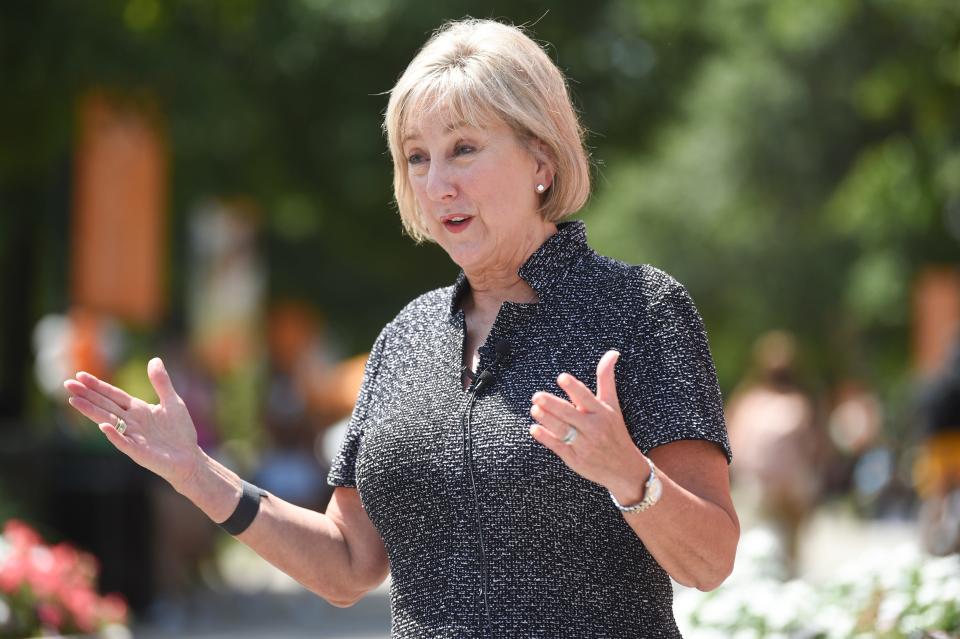The University of Tennessee could be splitting up its largest college – here's why
Administrators at the University of Tennessee at Knoxville are exploring the idea of splitting up the university's largest college – the College of Arts and Sciences.
The split would affect more than 750 faculty members and nearly 8,000 students in the college. Multiple ideas are on the table, according to the university, but faculty sources say conversations with the administration have centered on grouping similar departments together, including forming a college of the humanities, arts and social sciences and a separate college of sciences and math.
Administrators have been looking at restructuring the university's academic units since May 2021 in an attempt to prepare the university for a "rapidly changing educational landscape" with fewer traditional students, increasing changes in technology, declines in working-age populations and more.
"We see opportunities to organize in ways that align college administration to better meet faculty needs, create meaningful shared governance, and help disciplines innovate and grow," Kerry Gardner, UT's assistant director of news and information, said in an emailed statement to Knox News.
"We continue to have conversations with Colleges of Arts and Science faculty to explore the merits of structures that would focus on science and math, humanities and social sciences, and visual and performing arts. The conversations have yielded valuable feedback and multiple ideas are under consideration," Gardner said.
No decision has been made, but one could be coming soon. UT Chancellor Donde Plowman and Provost and Senior Vice Chancellor John Zomchick have held more than 19 engagement meetings since May about the potential split. A decision about any changes could be announced by October.
But even with those conversations, several faculty members in the college worry there hasn't been enough time for the campus community to provide feedback, given most of the engagement period was during the summer when most students were gone and some staff were on vacation, working off campus or conducting field research.
"We know there's going to be lots of costs of such a split. At minimum there's going to be a new college upper administration," said UT American Association of University Professors President Todd Freeberg in an interview with Knox News.
And as a new incentive-based budget model goes live this year, faculty wonder if this is the right time to shake up the academic structure. This new goal-based budget model gives academic units more control over their own budgets.
"This is a huge experiment we have running right now, and to introduce at this point a massive structural change to the largest college on campus is now going to add this huge extraneous variable to this experiment, and it's gonna make it much harder to interpret anything," Freeberg said.

There also are faculty and students whose departments don't quite fit in either a college of sciences and math or a college of humanities, arts and social sciences.
"There's a handful of departments – psychology being one, anthropology being one and geography being the one – that has a real mix of people in the social sciences and people in the natural sciences," Freeberg said.
"We would sort of be marooned in this leftover college," Freeberg added.
In May 2021, Plowman formed a working group of 20 deans, department heads and faculty members who outlined four alternatives to the existing academic structure in November 2021.
Some of these models require more change than others. During feedback sessions with staff primarily from the College of Arts and Sciences, several supported a model that focused on changing policies and procedures to meet future needs with little structural change.
Several opposed a model that would organize college structure by groupings of like-minded subjects, saying the shift could isolate departments and hurt interdisciplinary work.
"Faculty from arts and sciences consistently argued that the college is already an optimized ‘affinity’ group and that their co-location in a single, large academic unit is beneficial to all," the report reads.
Among UT's aspirational peer institutions, the University of Florida, University of Georgia the University of Wisconsin-Madison have kept their humanities, natural, physical and biological sciences and social sciences under one roof. Other universities like Michigan State University and Perdue have split them into separate colleges.
Meetings have picked up to answer questions from faculty. Since classes started on Aug. 24, Plowman and Zomchick have held at least five feedback sessions with staff from the humanities and social sciences departments.
"I do want to say that they have been meeting with with departments and they spent a lot of time taking questions and trying to answer those questions," Freeberg said.
But many faculty still want more information to understand the reason for the potential restructuring and additional opportunities to comment on more detailed proposals before the Plowman and Zomchick announce a final decision.
"There's been a huge cost to morale. I have not seen morale as bad as it is now, and this is my 21st year here," Freeberg said. "There's a lot of people in the humanities ... and social sciences really are feeling really low, like their voices are not being heard."
Faculty, staff and students can share feedback about the potential change online at provost.utk.edu.
Becca Wright: Higher education reporter at Knox News
Instagram | Twitter | Email | 865-466-3731
Enjoy exclusive content and premium perks while supporting strong local journalism. To get started, visit knoxnews.com/subscribe.
This article originally appeared on Knoxville News Sentinel: University of Tennessee could be splitting up its largest college

